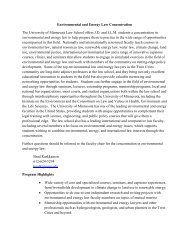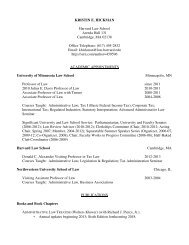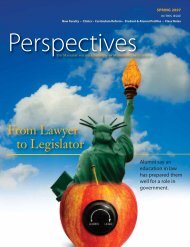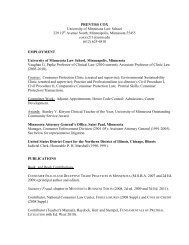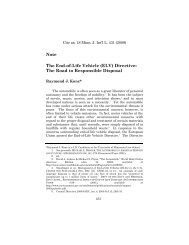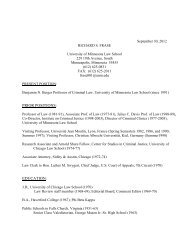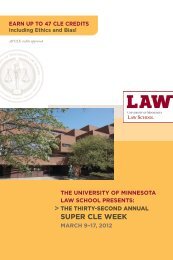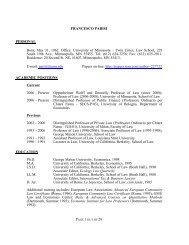Enabling Private Ordering - the University of Minnesota Law School
Enabling Private Ordering - the University of Minnesota Law School
Enabling Private Ordering - the University of Minnesota Law School
You also want an ePaper? Increase the reach of your titles
YUMPU automatically turns print PDFs into web optimized ePapers that Google loves.
2009] UMBRELLA CLAUSES 41<br />
statute or regulation, by itself, would suffice to constitute a<br />
treaty violation on <strong>the</strong> part <strong>of</strong> a Contracting Party and engage<br />
<strong>the</strong> international responsibility <strong>of</strong> <strong>the</strong> Party.” 102<br />
Likewise, <strong>the</strong> Tribunal in El Paso v. Argentina considered<br />
that:<br />
it would be sufficient to include a so-called “umbrella clause” and a<br />
dispute settlement mechanism, and no o<strong>the</strong>r articles setting standards<br />
for <strong>the</strong> protection <strong>of</strong> foreign investment in any BIT. If any violation <strong>of</strong><br />
any legal obligation <strong>of</strong> a State is ipso facto a violation <strong>of</strong> <strong>the</strong> treaty,<br />
<strong>the</strong>n that violation needs not amount to a violation <strong>of</strong> <strong>the</strong> high<br />
standards <strong>of</strong> <strong>the</strong> treaty <strong>of</strong> “fair and equitable treatment” or “full<br />
protection and security.” 103<br />
The Tribunal’s argument disregards that o<strong>the</strong>r investors’<br />
rights—including fair and equitable treatment, indirect<br />
expropriation, and nondiscrimination—concern obligations <strong>of</strong><br />
host States that are normally not addressed by investor-State<br />
contracts. 104 Host States usually do not promise, for example,<br />
nondiscrimination in contracts. Already from this point <strong>of</strong> view,<br />
umbrella clauses do not make o<strong>the</strong>r investors’ rights<br />
superfluous. The argument fur<strong>the</strong>r disregards that not all<br />
foreign investment projects are based on a contract between a<br />
foreign investor and a host State. Instead, foreign investment<br />
also takes place by <strong>the</strong> unfolding <strong>of</strong> economic activity on <strong>the</strong><br />
basis <strong>of</strong> <strong>the</strong> host State’s general legislation or by capital<br />
investment in foreign companies. These types <strong>of</strong> investments<br />
are <strong>the</strong>refore not covered by <strong>the</strong> scope <strong>of</strong> application <strong>of</strong> umbrella<br />
clauses because no investor-State contracts or similar<br />
instruments serve as a basis <strong>of</strong> <strong>the</strong> investor’s economic activity.<br />
In fact, <strong>the</strong>se types <strong>of</strong> foreign investments regularly generate<br />
investment treaty disputes that are exclusively concerned with<br />
<strong>the</strong> conformity <strong>of</strong> changes in <strong>the</strong> host State’s general regulatory<br />
framework or administrative conduct and do not involve<br />
breaches <strong>of</strong> promises made vis-à-vis <strong>the</strong> foreign investor. 105<br />
102. Id.<br />
103. El Paso Energy Int’l Co. v. Argentine Republic, ICSID (W. Bank) Case No.<br />
ARB/03/15, Decision on Jurisdiction, para. 76 (Apr. 27, 2006).<br />
104. Schreuer, supra note 4, at 253; see also Eureko, supra note 6, para. 258<br />
(“[R]eliance by <strong>the</strong> Tribunal in SGS v. Pakistan on <strong>the</strong> maxim in dubio mitius so as<br />
to effectively presume that sovereign rights override <strong>the</strong> rights <strong>of</strong> a foreign investor<br />
could be seen as a reversion to a doctrine that has been displaced by contemporary<br />
customary international law . . . .”).<br />
105. See generally International Thunderbird Gaming Corp. v. The United<br />
Mexican States, UNCITRAL/NAFTA, Arbitral Award (Jan. 26, 2006) (alleging that<br />
Mexico breached its NAFTA obligations); Methanex Corp. v. United States <strong>of</strong><br />
America, UNCITRAL/NAFTA, Final Award (Aug. 3, 2005) (alleging that <strong>the</strong> United



